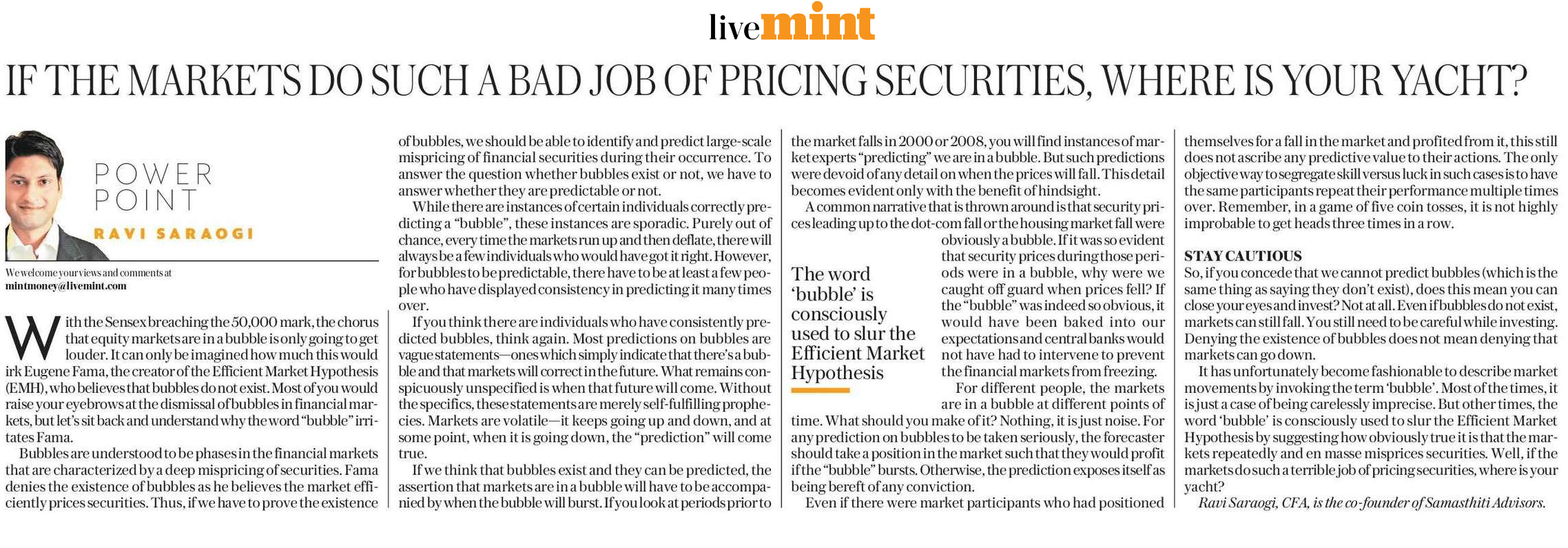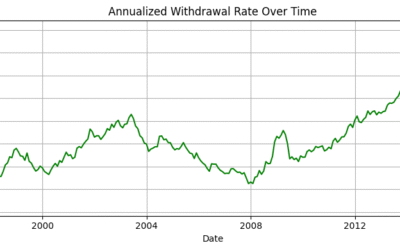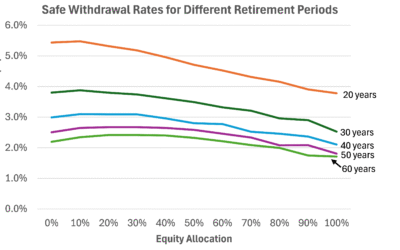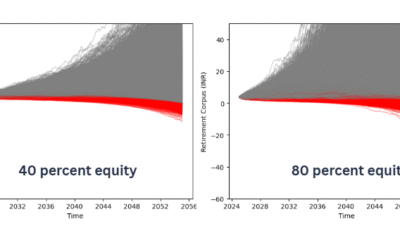The word ‘bubble’ is consciously used to slur the Efficient Market Hypothesis
With the Sensex breaching the 50,000 mark, the chorus that equity markets are in a bubble is only going to get louder. It can only be imagined how much this would irk Eugene Fama, the creator of the Efficient Market Hypothesis (EMH), who believes that bubbles do not exist. Most of you would raise your eyebrows at the dismissal of bubbles in financial markets, but let’s sit back and understand why the word “bubble” irritates Fama.
Bubbles are understood to be phases in the financial markets that are characterized by a deep mispricing of securities. Fama denies the existence of bubbles as he believes the market efficiently prices securities. Thus, if we have to prove the existence of bubbles, we should be able to identify and predict large-scale mispricing of financial securities during their occurrence. To answer the question whether bubbles exist or not, we have to answer whether they are predictable or not.
While there are instances of certain individuals correctly predicting a “bubble”, these instances are sporadic. Purely out of chance, every time the markets run up and then deflate, there will always be a few individuals who would have got it right. However, for bubbles to be predictable, there have to be at least a few people who have displayed consistency in predicting it many times over.
If you think there are individuals who have consistently predicted bubbles, think again. Most predictions on bubbles are vague statements—ones which simply indicate that there’s a bubble and that markets will correct in the future. What remains conspicuously unspecified is when that future will come. Without the specifics, these statements are merely self-fulfilling prophecies. Markets are volatile—it keeps going up and down, and at some point, when it is going down, the “prediction” will come true.
If we think that bubbles exist and they can be predicted, the assertion that markets are in a bubble will have to be accompanied by when the bubble will burst. If you look at periods prior to the market falls in 2000 or 2008, you will find instances of market experts “predicting” we are in a bubble. But such predictions were devoid of any detail on when the prices will fall. This detail becomes evident only with the benefit of hindsight.
A common narrative that is thrown around is that security prices leading up to the dot-com fall or the housing market fall were obviously a bubble. If it was so evident that security prices during those periods were in a bubble, why were we caught off guard when prices fell? If the “bubble” was indeed so obvious, it would have been baked into our expectations and central banks would not have had to intervene to prevent the financial markets from freezing.
For different people, the markets are in a bubble at different points of time. What should you make of it? Nothing, it is just noise. For any prediction on bubbles to be taken seriously, the forecaster should take a position in the market such that they would profit if the “bubble” bursts. Otherwise, the prediction exposes itself as being bereft of any conviction.
Even if there were market participants who had positioned themselves for a fall in the market and profited from it, this still does not ascribe any predictive value to their actions. The only objective way to segregate skill versus luck in such cases is to have the same participants repeat their performance multiple times over. Remember, in a game of five coin tosses, it is not highly improbable to get heads three times in a row.
STAY Cautious
So, if you concede that we cannot predict bubbles (which is the same thing as saying they don’t exist), does this mean you can close your eyes and invest? Not at all. Even if bubbles do not exist, markets can still fall. You still need to be careful while investing. Denying the existence of bubbles does not mean denying that markets can go down.
It has unfortunately become fashionable to describe market movements by invoking the term ‘bubble’. Most of the times, it is just a case of being carelessly imprecise. But other times, the word ‘bubble’ is consciously used to slur the Efficient Market Hypothesis by suggesting how obviously true it is that the markets repeatedly and en masse misprices securities. Well, if the markets do such a terrible job of pricing securities, where is your yacht?
(This article was published in LiveMint on Feb 05, 2021 and can be accessed from the link https://www.livemint.com/opinion/columns/if-the-markets-do-such-a-bad-job-of-pricing-securities-where-is-your-yacht-11612462141034.html)







0 Comments